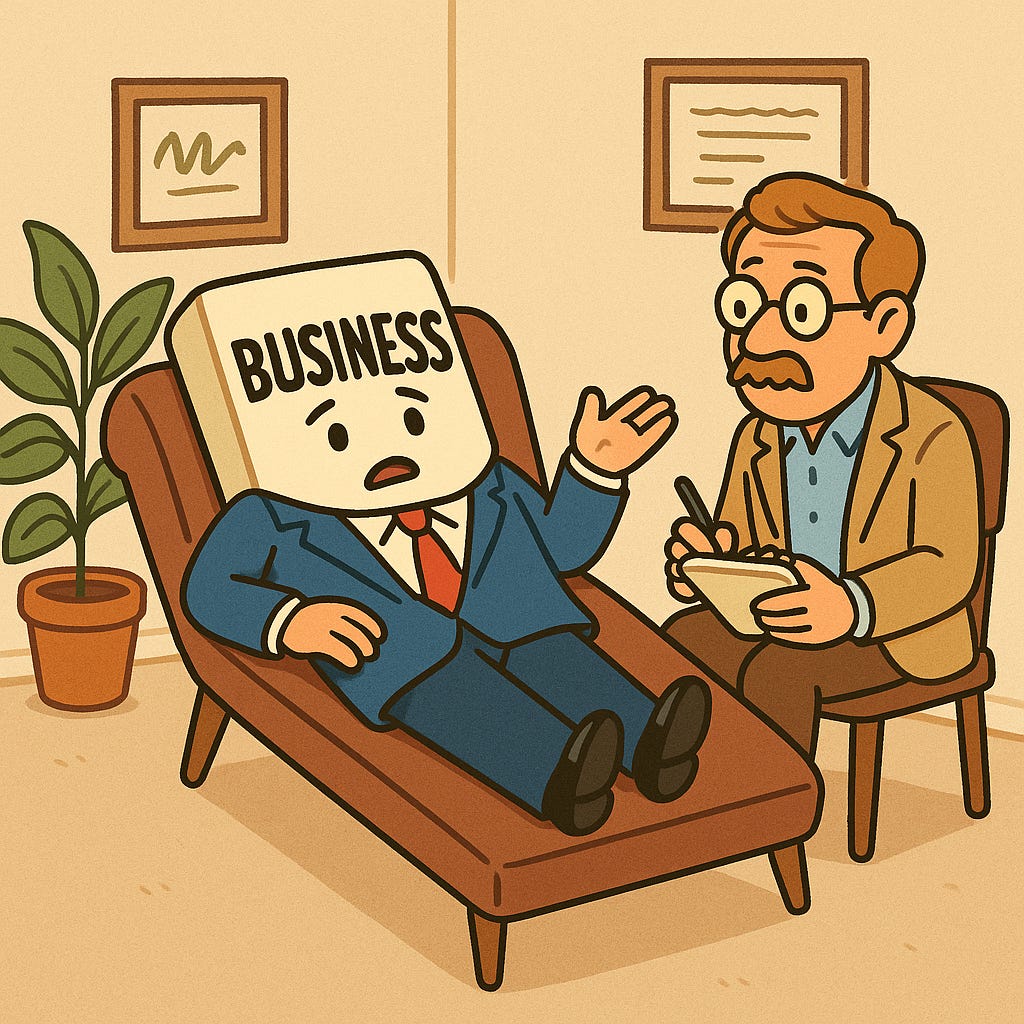Customer Therapy: Why Your B2B Clients Tell You Things They’d Never Tell A Corporate
Your superpower is being safe enough to hear the truth
A friend who runs a small-ish creative agency in London recently shared something that perfectly captures the hidden advantage small(er) companies have over big companies. And I think the insights are applicable to all SMEs. selling to other businesses.
They were presenting brand concepts to an insurance client - the kind of traditional company where everything runs through multiple stakeholders and procurement. After the formal presentation, the marketing director walked them to the lift and quietly said:
“The CEO’s already decided he wants something completely different. Can we talk?”
What followed was a 20-minute conversation in the lobby where she explained the real situation: the board had hired an expensive digital transformation consultancy, internal teams were resistant to change, and she needed an approach that looked innovative but wouldn’t disrupt current operations. It was radical candor at its finest.
This wasn’t in any brief. It wouldn’t appear in any procurement document. But it was the actual problem that needed solving.
The Intelligence Gap
From my experience, this happens alot in B2B services. The official brief is one thing. The real brief - shared in informal moments - is something else entirely:
A fintech’s official brief: “Define our future customer journey.” The reality: “We’re not setup to scale”
A law firm’s official brief: “Modernise our visual identity.” The reality: “Senior partners hate change but they’re retiring soon”
A tech company’s official brief: “Develop thought leadership.” The reality: “Make our CEO look like a visionary”
Large corporates and consultancies can miss this layer of intelligence. They’re too formal, too process-driven, too removed from the day-to-day reality of their clients’ businesses. Basically, they forget that B2B sales is actually still H2H - Humans to Humans (I genuinely hope that rephrase catches on).
Why SMEs Get the Truth
Small companies and consultancies occupy a unique position. You’re successful enough to be taken seriously, but not so large that you’re seen as a political threat or another layer of corporate bureaucracy. Or quite simply put, if you can get past the corporate bluster and sycophancy and you’ll see that genuine success comes from relationships. As relationships are the source of results a great boss once told me.
As your clients will tell you:
Which stakeholders actually make decisions (rarely who’s listed as the approver)
Why they really fired their last supplier
What internal politics could derail the project
Where the real budget comes from
What’s actually keeping the leadership team awake at night
They share this because you’re safe. You’re not connected to their competitors. You’re not about to be acquired by a holding company. You’re just trusted partners who’ve proven you can deliver.
Building Trust That Generates Intelligence
The most successful SMEs systematically build these trust relationships:
1. Create Informal Touch Points
Skip the boardroom. Have kickoffs and first meetings over coffee (or go all out and support your local pub). Schedule reviews in their office kitchen. The best intelligence comes from relaxed conversations, not formal meetings.
2. Demonstrate You Understand Their Reality
Share relevant examples of similar challenges you’ve seen at similar size companies. Not name-dropping, but showing you understand their world. “We’ve seen this situation before” is remarkably reassuring.
3. Ask Better Questions
Instead of “What are your business objectives?” try “What happens if this project fails?” Instead of “Who are the stakeholders?” ask “Who’s going to make your life difficult on this?”
4. Document Strategically
Keep notes on the real dynamics: “Sarah - needs quick win before year end review” or “Team frustrated with current tech stack, decision likely Q2.” This context is gold.
Converting Trust Into Value
Here’s where it gets interesting commercially. You can’t invoice for “understanding your political landscape” but you can:
Propose solutions to problems they haven’t officially acknowledged
Price in the value of navigating complex stakeholder dynamics
Be prepared when sudden “urgent” needs arise (that you saw coming months ago)
Position yourself as indispensable because you understand what’s really happening
Don’t be scared to say it how it is and park your ego if you don’t get the communication style right first time.
The Sustainable Advantage
This isn’t about being manipulative or political. It’s about being human enough that other humans trust you with reality, not just rhetoric.
Large consultancies can’t replicate this. They have:
Account teams that rotate regularly
Too many connections to competitors
Processes that demand formal documentation
Cultures that discourage admission of uncertainty
You have relationships. You have trust. You have the ability to hear what’s really being said and solve the actual problem.
In a world where every company claims to be a “trusted advisor,” SMEs can actually be one. Not through credentials or methodologies, but through genuine human connection that reveals what really needs to be done.
That’s an advantage no procurement process can commoditise.
What’s your take? I’m always interested to know how you’re dealing with this where you work.




